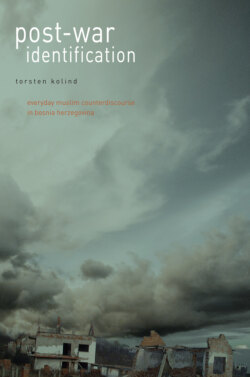Читать книгу Post-War Identification - Torsten Kolind - Страница 28
Anxiety about one’s family members
ОглавлениеThe last theme I will touch on here is the insecurity and anxiety people felt not knowing anything about the fate of family members. A related theme is the feeling of desperation caused by not being able to provide for one’s children, because it was not possible to fed or protect them. It was not just in Stolac that men and boys were imprisoned. It also happened elsewhere in Herzegovina, and formed part of a Croatian strategy of ethnic cleansing. The women knew that similar things were going on in other places, but nobody knew exactly what was happening to their men, whether they were dead or alive, until the men were allowed to send letters through the Red Cross. In these letters, the men always wrote that they were well; they did not dare to write the truth as they feared the Croats would read the letters. Emir was one of the first to be released from prison camp. He was then 18. He was sent to Germany, where he sent a message using a radio telephone reporting that he was all right. But he did not see his family for the next five years. The men who were captives in the prison camps were also filled with worry and anxiety: they had no news about their families for anywhere from five to ten months, depending on how long they were detained.
Osman: I was in prison camp for six months and it was terrible for me because I was sick. During the whole time in prison camp I did not get two litres of water. And we did not have food enough, and everybody just wanted water and food. But I escaped it without any injuries, and I was not beaten. All the time I thought that they were going to kill me, all the time, even though I was not guilty of anything. The worst thing was not to know where my family was, if they were alive or not, and when I got out of the camp, I had to start looking for them.
It was terrible for parents not to be able to take proper care of their children. The children were hungry and frightened. They could not understand their situation and were exposed to great danger, and the parents could do very little to help. A woman called Fata recalls how providing for her children made everything else less important:
They shot at us from two different sides. During the war between Muslims and Croats I lived in Mostar and we did not have water in the houses and you had to go to Neretva [the river] to fetch water. And we passed the Harem [Muslim graveyard] on our way to Neretva, and we saw them burying the dead soldiers and civilians. You did not think at all that tomorrow or the day after tomorrow you might be buried the same way yourself. You did not fear. You knew you had to go to the river to get water, because the kids needed water, and you just had to make it to the river. It was like you did not care about being killed. We just walked without fear.
The themes in this section all focus on aspects of an everyday world that suddenly became problematic: food, shelter, security, and basic social relations. Together, they constitute a fundamental aspect of the unmaking of my informants’ world.
